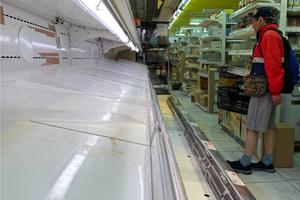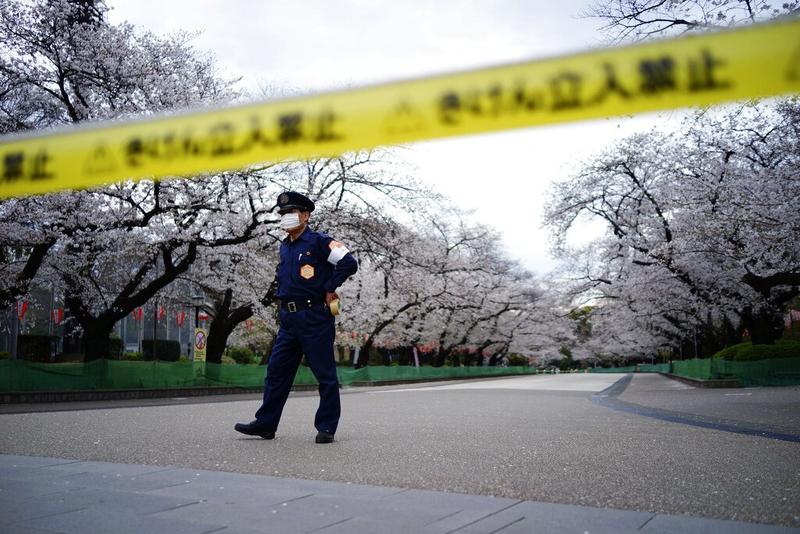 A shopper looks at empty shelf at a grocery store in Tokyo, March 26, 2020. Residents of Tokyo on Thursday raced to stock up on foods and daily necessities after its governor on Wednesday called on residents to stay at home during this coming weekend amid rising infections of new coronavirus in the capital city. (PHOTO / AP)
A shopper looks at empty shelf at a grocery store in Tokyo, March 26, 2020. Residents of Tokyo on Thursday raced to stock up on foods and daily necessities after its governor on Wednesday called on residents to stay at home during this coming weekend amid rising infections of new coronavirus in the capital city. (PHOTO / AP)
TOKYO - Large queues formed at supermarkets and stores in Tokyo on Friday as residents in the Japanese capital prepared for a weekend at home, after the city’s governor called on them to remain indoors to prevent the spread of the coronavirus.
Governor Yuriko Koike’s plea on Wednesday to refrain from non-essential, non-urgent outings through April 12, and especially this weekend, prompted residents to stock up on everything from instant noodles and rice to toiletries and fresh produce, despite public-service warnings against hoarding.
Tokyo residents stock up on everything from instant noodles and rice to toiletries and fresh produce, despite public-service warnings against hoarding
Yuri Inoue, a 31-year-old graphic designer in Tokyo, said she was one of the “panic buyers”, hoarding food for the next two weeks to allay concerns from her parents living outside Tokyo.
READ MORE: World food security at risk with export curbs, spike in import
“If convenience stores and supermarkets will stay opened, people should stay calm. The government should emphasize that point more strongly,” she told Reuters.
In one residential neighbourhood, more than a dozen people lined up for toilet paper at a local drug store. One of them, an elderly woman, leaned on her walker as she held a 10,000-yen (about US$92) note in her hand.
Tokyo governor Koike asked for calm while repeating her pleas to refrain from weekend public gatherings.
“But I am saying you can go to supermarkets to buy food or medicines or go to hospitals,” Koike said at a coronavirus meeting for the Tokyo government.
“There are acts of securing things like food, but I would like to ask Tokyo citizens for calm behaviour.”
Tokyo has seen a surge in coronavirus cases this week, reporting a record 47 cases on Thursday for a total of 259.
 A security person stands guard at a famed street of cherry blossoms which is closed as a precaution against the spread of the new coronavirus at Ueno Park in Tokyo, March 27, 2020. (EUGENE HOSHIKO / AP)
A security person stands guard at a famed street of cherry blossoms which is closed as a precaution against the spread of the new coronavirus at Ueno Park in Tokyo, March 27, 2020. (EUGENE HOSHIKO / AP)
While not many for a city of nearly 14 million, experts have warned of a high risk of an “overshoot” - or explosive rise - given that more than half of the newest cases could not be traced.
Tokyo has seen a surge in coronavirus cases this week, reporting a record 47 cases on Thursday for a total of 259
The Tokyo area has also asked residents to refrain from congregating to view its famous spring cherry blossoms at parks and plans to close its zoos and aquariums for two weeks.
Parts of three public parks in Tokyo will be closed off until the flower-viewing season is over, a Tokyo government official told Reuters, without specifying the dates.
And retail giants Takashimaya and Matsuya said they would shutter multiple department stores in the greater metropolitan area on the upcoming weekend.
Coronavirus infections have climbed to more than 1,400 nationwide with 47 deaths, excluding those from a cruise ship that was quarantined last month. Globally, infections have topped half a million people and deaths at more than 24,000.
Prime Minister Shinzo Abe is expected to order his cabinet to compile an economic package with spending worth US$135 billion or more, government officials and lawmakers say, joining global policymakers in rolling out fiscal stimulus to avert a downturn from the spreading pandemic.
Tokyo has not declared an emergency or a full-blown lockdown, and its streets were not as deserted as many European cities, where laws are forcing residents to stay indoors
Tokyo has not declared an emergency or a full-blown lockdown, and its streets were not as deserted as many European cities, where laws are forcing residents to stay indoors.
But during rush hour around 8 am, some subway lines in central Tokyo where commuters normally stand elbow-to-elbow were visibly less crowded, some even with empty seats.
ALSO READ: Indians scramble for supplies as three-week virus lockdown begins
A truck driver delivering toilet paper and tissues to drug stores said he’d been working 12 to 13-hour shifts every day for the past month - compared with five-day weeks of 9-10 hours before the hoarding began.
“It’s been tough,” he told Reuters, declining to give his name. “This job involves a lot of lifting, so I don’t know how long my body can last at this pace.”
Others worried about losing work as economic activity slows.
“They say we have to stay in but I’ll probably end up going out since otherwise I won’t make any money,” said taxi driver Takahiko Nihei.
“If I stay at home I’ll just worry about things: money, the virus, making a living. But if I get out and around, I can forget this for a while.”


